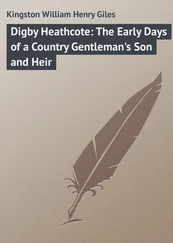William Kingston - Roger Kyffin's Ward
Здесь есть возможность читать онлайн «William Kingston - Roger Kyffin's Ward» — ознакомительный отрывок электронной книги совершенно бесплатно, а после прочтения отрывка купить полную версию. В некоторых случаях можно слушать аудио, скачать через торрент в формате fb2 и присутствует краткое содержание. Издательство: Иностранный паблик, Жанр: foreign_prose, foreign_children, на английском языке. Описание произведения, (предисловие) а так же отзывы посетителей доступны на портале библиотеки ЛибКат.
- Название:Roger Kyffin's Ward
- Автор:
- Издательство:Иностранный паблик
- Жанр:
- Год:неизвестен
- ISBN:нет данных
- Рейтинг книги:5 / 5. Голосов: 1
-
Избранное:Добавить в избранное
- Отзывы:
-
Ваша оценка:
- 100
- 1
- 2
- 3
- 4
- 5
Roger Kyffin's Ward: краткое содержание, описание и аннотация
Предлагаем к чтению аннотацию, описание, краткое содержание или предисловие (зависит от того, что написал сам автор книги «Roger Kyffin's Ward»). Если вы не нашли необходимую информацию о книге — напишите в комментариях, мы постараемся отыскать её.
Roger Kyffin's Ward — читать онлайн ознакомительный отрывок
Ниже представлен текст книги, разбитый по страницам. Система сохранения места последней прочитанной страницы, позволяет с удобством читать онлайн бесплатно книгу «Roger Kyffin's Ward», без необходимости каждый раз заново искать на чём Вы остановились. Поставьте закладку, и сможете в любой момент перейти на страницу, на которой закончили чтение.
Интервал:
Закладка:
Such was the grand-dame under whose care Harry Tryon was to be brought up. Dr Jessop was not happy about the matter. He would far rather that the honest clerk had taken charge of the boy. He resolved, however, as far as he had the power, to counteract the injudicious system he discovered that Lady Tryon was pursuing. For this purpose he won the little fellow’s affection, and as he was a constant visitor at the house in his official capacity, he was able to maintain his influence. When her ladyship went to town he induced her to allow Harry to come and stay with him, and on these occasions he never failed to invite Roger Kyffin down to pay him a visit. The worthy clerk’s holidays were therefore always spent in the neighbourhood of Lynderton. The two kindly men on these occasions did their best to pluck out the ill weeds which had been growing up in Master Harry, while under his grandmother’s care. It was, however, no easy task to root them out, and to sow good seed in their stead. Still, by their means Harry did learn the difference between good and evil, which, if left to Lady Tryon’s instructions, he certainly would never have done. He also became very much attached to the old doctor and to his younger friend, and would take advice from them, which he would receive from no one else. He grew up a fine, manly boy, with many right and honourable feelings; and though his mental powers might not have been of a very high order, he had fair talents, and physically his development was very perfect. Lady Tryon herself began to teach him to read, and as he showed a considerable aptitude for acquiring instruction, and gave her no trouble, she continued the process till he was able to read without difficulty by himself. She put all sorts of books into his hands, from which his brain extracted a strange jumble of ideas. He certainly acquired very good manners from his grandmother, and to the surprise of the neighbourhood, when he was ten years old there was scarcely a better behaved boy in Lynderton. Dr Jessop then suggested that he should be sent to Winchester School, or some other place of public instruction. Lady Tryon would not hear of this, though she consented that he should attend the grammar school at Lynderton. For this the worthy doctor was not sorry.
“I can look after him the better,” he said to himself, “and go on with the process of pulling up the weeds during her ladyship’s absence.” Harry’s holidays were generally spent in the country. Twice, however, his grandmother had him up to London in the winter. On these occasions, Mr Kyffin got leave from her ladyship to have him to stay with him part of the time. Every spare moment of the day was devoted to the lad. He took him to all the sights of London, and in the evenings contrived for him variety of amusement. Harry became more and more attached to Mr Kyffin, and more ready to listen to his advice, and more anxious to please him. Thus the boy grew on, gaining mental and physical strength, though without forming many associates of his own rank in life. His manners were very good, and his tastes were refined, and this prevented him associating with the ordinary run of boys at the grammar school.
Chapter Four.
Harry Tryon’s First Adventure. – Lynderton and its Neighbourhood
Harry Tryon in his new home had the sea constantly before his eyes. Sometimes he saw it blue and laughing, and dotted over with the white canvas of numerous vessels glistening in the sunshine. At other times the stout ships were tossed by tempests, or doing battle with the foaming waves. Often the boy longed for the life of a sailor, to go forth over that broad unknown ocean in search of adventure; but the old lady would not hear of it. It was the only wish in which she thwarted him: she usually spoiled him, and gave him everything he asked for, especially if he cried loud enough for it. But he was now getting too old to cry for what he wanted, and he must take some other means to obtain his wishes. Poor Harry! his nursery life had been a checkered one; sometimes shut up by himself in a dark room, sometimes almost starved and frightened to death; at others pampered, stuffed with rich food, exhibited in the drawing-room as a prodigy, his vanity excited, and allowed to do exactly as he listed. Perhaps one style of treatment checked the bad effects of the other.
Lynderton stood on the bank of a small river. Harry had no difficulty in obtaining a boat, in which he learned to row. Lady Tryon did not know how he was employed, or she would probably have sent for him, and kept him driving about in her musk-smelling carriage, which Harry hated. As he grew older he managed to get trips in fishing vessels, on board small traders which ran between the neighbouring ports, and sometimes he got a trip on board a revenue cruiser – the old “Rose,” well known on the coast. There were not many yachts in those days; but two or three of the people residing at Lynderton had small vessels, and Harry was always a welcome guest on board them. His love for the sea was thus partially gratified and fostered, and he became a first-rate hand in a boat or yacht. Still he yearned for something else.
One day he was standing on the quay at the foot of the town, when a stout sailor lad stopped near him, and putting out his hand exclaimed: “Well, Master Harry! I did not know you at first: you are grown so. You’re looking out for a sail down the river, I’ll warrant?”
“You are right, Jacob,” answered Harry, shaking the proffered hand. “I have not had a sniff of salt water for the last week. But where have you been all this time?”
“I have been to sea, Master Harry – to foreign lands – and if you are so minded I will help you to take a trip there, too.”
“You have not been away long enough to go to any foreign lands that I know of, except perhaps the coast of France or to Holland,” observed Harry.
“That’s just where I have been, Master Harry, and if you like to come down along the quay I will show you the craft I went in. She’s not one a seaman need be ashamed of, let me tell you.”
Harry accompanied his friend. Jacob Tuttle had been one of Harry’s first companions in a boat, and he indeed taught him to row. As he was six or eight years older than Harry, the latter looked at him with great respect, and considered him an accomplished seaman. He was, indeed, a good specimen of the British sailor of those days, brave, open-hearted, and generous, but with the smallest possible amount of judgment or discretion. Harry accompanied him along the bank of the river for some distance.
“There! what do you think of her?” asked Jacob, pointing to a wonderfully long, narrow lugger which lay alongside the wooden quay or jetty. “She measures 120 feet from the tip of her bowsprit to the end of her outrigger, and she sails like the wind. We pull forty oars, and there is no revenue cutter can come near us, blow high or blow low.” The vessel at which Harry and his companion were looking was indeed a beautiful craft. She had fore and aft cuddies for sleeping berths, and was open amid-ships “for the stowage of 2,000 kegs of spirits,” Jacob whispered in Harry’s ear. “Would you not like to take a trip in her, Master Harry?”
Harry confessed that he should like it very much.
Lady Tryon was on the point of starting for London. Probably the “Saucy Sally” would not sail for two or three days. He might make the trip and be back again without anybody knowing anything about it. Tuttle would introduce Harry to the skipper. He was a first-rate fellow, whether an Englishman or a foreigner he could not tell, but his equal was not easily to be found. It was a pleasure to be with him in a gale of wind, and to hear him issue his orders. Captain Falwasser was his name. The “Saucy Sally” carried fifty hands, officers and crew, all told, and had guns too, but they were kept stowed away below, unless wanted.
Читать дальшеИнтервал:
Закладка:
Похожие книги на «Roger Kyffin's Ward»
Представляем Вашему вниманию похожие книги на «Roger Kyffin's Ward» списком для выбора. Мы отобрали схожую по названию и смыслу литературу в надежде предоставить читателям больше вариантов отыскать новые, интересные, ещё непрочитанные произведения.
Обсуждение, отзывы о книге «Roger Kyffin's Ward» и просто собственные мнения читателей. Оставьте ваши комментарии, напишите, что Вы думаете о произведении, его смысле или главных героях. Укажите что конкретно понравилось, а что нет, и почему Вы так считаете.












